I am going to talk about Open Press, a two-day literary festival that took place in Los Angeles this past October 11 & 12. Let me be clear: in no way do I speak on behalf of any Los Angeles community of writers, even though Los Angeles is where I live and work and have discussions and eat meals alongside other writers.
Take note: my abilities don’t lend themselves to journalism. I can’t inhabit the mindset of a journalist— journalists seem to have a knack for piecing together narratives by expunging the irrelevant bits of information in favor of the relevant ones, as if that kind of sorting-out process can be known in advance. Plus, I am having difficulty writing about an intricate series of events that just happened (I remember people writing about what the Occupy movement was all about just hours after it had been destroyed by the LAPD, with its aftermath still in the raw stages). But I will try to tell you what happened. Because the event was great. And we are very likely going to try to make it an annual occasion.
Open Press started with the idea that there are many writers who are also independent, small-press publishers. I am one of them. With Harold Abramowitz, I edit the press eohippus labs. Like many other writers who operate artist-run presses, we think of editing and publishing as another iteration of writing, one that is inextricable from our other, more direct writing practices. Since many writers who are also publishers cannot manage a studio of their own (even though they fantasize about it), they publish out of their homes. Writing is created in living rooms, basements, and bedrooms, but it is historically published there too. Open Press was interested in these intimacies. With the exception of an event hosted at the Poetic Research Bureau, all panels, discussions, and performances took place inside people’s homes, so that attendees could sit in the spheres where the presses created their work. The event also was intended to involve mostly West Coast small-press publishers.
The first event was an interactive panel discussion on small-press publishing and happened on a Saturday afternoon at Les Figues headquarters (a house belonging to Teresa Carmody and Vanessa Place). The discussion was co-curated by Teresa Carmody and Andrea Quaid. Members included Tim Roberts of Counterpath Press, Chiwan Choi of Writ Large Press, Diana Arterian of Ricochet Editions.
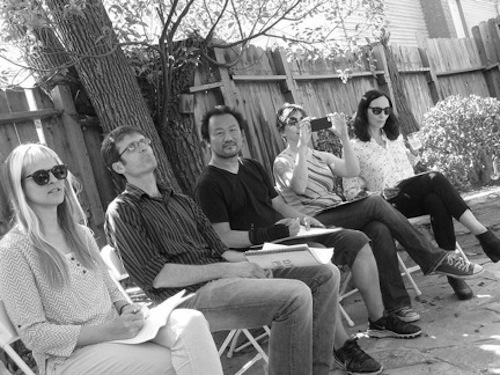
As part of the discussion prompt, Andrea asked, “How do you think about the relationship or engagements between your press and community, communities?” Here is what Andrea said about the discussion:
We talked about sociality and Fred Moten’s idea that writing is one of many expressions of it. We asked how this might shift our attention to new questions about editing, publishing, and talking together right here right now. We explored our commitments to the book and the writer. We questioned the book object and digital “free” publication and what labor may be erased in both. We discussed different intimacies that emerge as and through editorial work with writers, texts and future readers. We championed the flawed manuscript and what it means to support another’s work. We argued impermanence versus duration and impermanence and duration. We discussed literary events, and what it means to show up for another’s work and to create a space for others to show up. We imagined how to imagine otherwise and how this happens together, and how the book, reading, gathering to talk, may be evidence and extension of this.
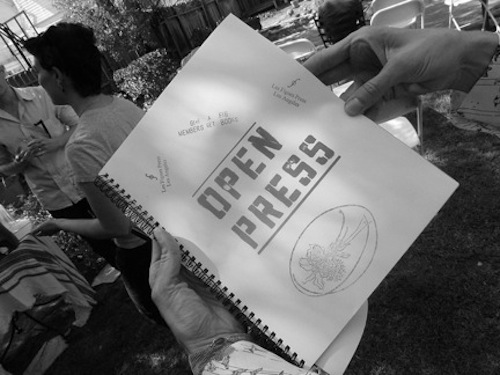
The second event happened Saturday night at the Poetic Research Bureau, a space in Chinatown curated by Andrew Maxwell, Ara Shiranyan, and Joseph Mosconi. The PRB hosted the press Song Cave and had readings by Todd Colby, Jane Gregory, and Graham Foust.
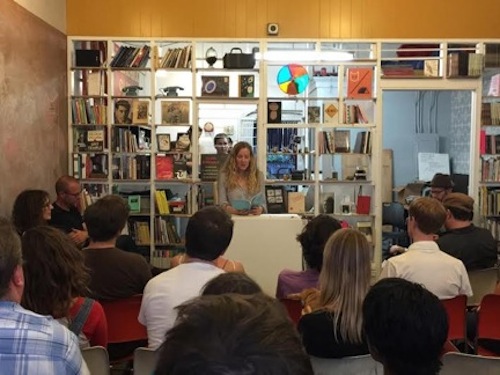
Here is what an anonymous PRB dispatcher said about the event:
On an unusually balmy late Saturday afternoon, Open Press moved its improvised herd to the Diagon Alley of LA’s Chinatown, Chung King Road, the pedestrian avenue of art galleries and souvenir trinket shops that is home to the Poetic Research Bureau and LA’s original chapter of the Public School. All the presses set up tables along the alley and made way for roughly 75 folks, who subsequently squeezed into the cozy box fort of the PRB to hear three writers published by The Song Cave read from recent work on the press: Graham Foust, Todd Colby and Jane Gregory. Andrew Maxwell introduced the press, which is edited by Ben Estes and Alan Felsenthal, and praised it for its commitment to both the personal chapbook form and for making its archives free online as downloadable PDFs—which finds sympathy in the PRB’s allegiance to public access literature. Also mentioned was The Song Cave’s reactivation of out-of-print astonishments like the recent collection of the ecstatic miniaturist Alfred Starr Hamilton.
Graham Foust led off the selection of readers with a range of work, including “To Graham Foust on the Morning of His Fortieth Birthday,” which like many of Graham’s poems, reads like an equestrian course of aphorisms made stranger by their constellation, and speaks to paradoxes of poetic production: “Tiny hawks of poetry all over you, you sit at screens to
punch a book into a world.” He was followed up by Todd Colby, who read from Splash State, and ever the frontman and charismatic lyricist, Todd led with coy seductions and unabashed pillow lines while enjoining the audience to “Show me something perfect to talk about.” The night’s final reader was Jane Gregory, down from Berkeley, who stunned the audience with a mysterious and hybrid language describing “the book I will not write” while unfolding the wild book she was writing then, as she read from new work and her Song Cave book My Enemies both. Ara Shirinyan took to whooping his approval in the back near the sad rubber plant propping open the storefront door.As ever with the PRB, folks hung out for an hour or more after the poems, talking smack and minor projects over cheap canned beer and aged Macallan, before scattering to various grub hubs for vegan charcuterie, Highland Park birria, Korean kimchi bowls, or craft suds at the Chinese-lantern-festooned Melody Lounge. Food trumps poetry most nights in LA, but the conversation turned back to literature nonetheless, as if that perfect synthesis were possible after all.
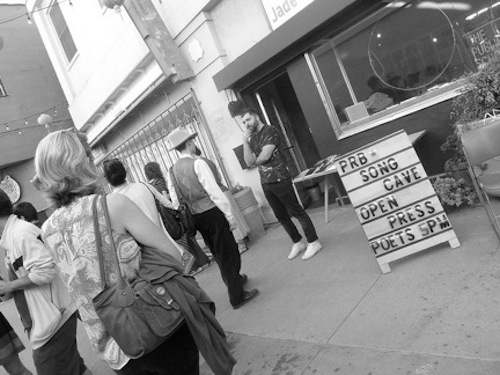
Then on Sunday afternoon, eohippus labs hosted an panel discussion at Harold’s apartment. The topic was the compromised body. I wrote about it here.
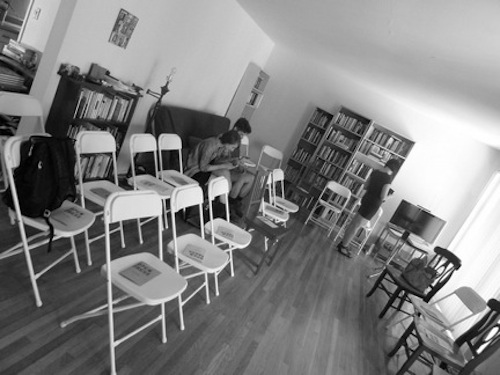
The final event of was a series of performances that took place Sunday night at Mathew Timmons’s home. Mathew edits Insert Blanc Press. Also present was Gauss PDF, edited by J. Gordon Faylor, and Phoneme Media, edited by David Shook.
Here is some of what happened:
Insert press authors Andrew Choate and William Moor read their work. Also representing Insert Blanc, Jay Erker did a series of silent performances pieces. Here, she is reading from her book without speaking. She sits under a portrait of herself.
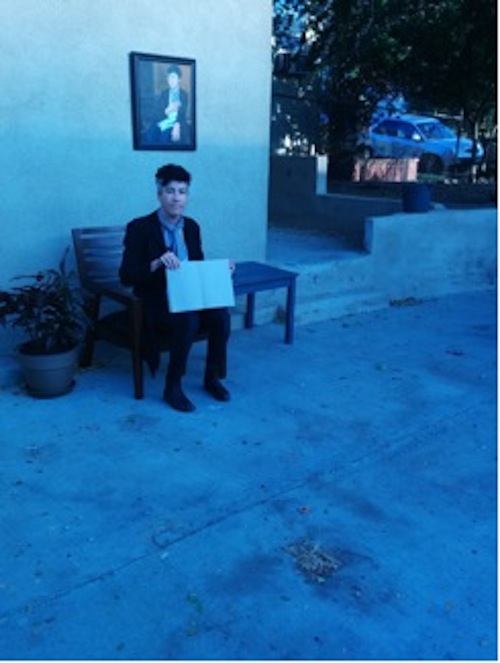
David Shook introduced his press, Phoneme Books. Phoneme largely publishes works in translation, emphasizing languages that are less-often represented. For example, Phoneme is publishing translations of Uyghur, Serbian, Zoque, Isthmus Zapotèc, and Haustecan Nahuatl.
Representing Phoneme was Estonian writer Kristiina Ehin. She read in both Estonian and English, and one of her poems was dedicated to a scientist who believes the universe is shaped like a giant beehive— so far, she said, his theory has not been disproven. Silver Sepp also played Estonian folk music; his instrument was a piece of wood that belonged to his grandfather as part of an old fishing net.
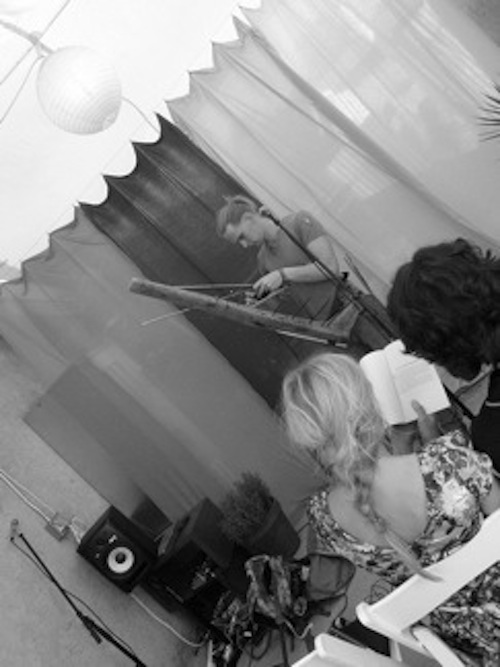
One of Phoneme’s current projects is a graphic novel called Obi’s Nightmare, a book that David describes as “soon to be banned in 50 countries.” Obi’s Nightmare is one of the first graphic novels to come out of Equatorial Guinea. According to David, the book imagines what would happen if “corrupt and kleptocratic leader President Teodoro Obiang Nguema had to live as a common person for one day.” David says:
This edition of 300 copies was produced especially for the 2014 U.S.-Africa Leaders Summit in early August, which brought together 48 African heads of state--including our protagonist Obi himself--and other leaders. In early 2015, EG Justice is smuggling "covert edition" Spanish-language copies into Equatorial Guinea--I'm not sure how and they're not telling.
David writes more about Equatorial Guinea here.
Next, J. Gordon Faylor gave a talk about Gauss PDF that was a parody of a sales pitch. Imagine if a TED talk were to be fed into the mouth of an ouroboros. In other words, imagine a TED talk eating itself forever. There would only be infinite, self-fulfilling recursions of commercial speak, of “attributing processing fields.” We would forever be getting welcomed into the board room. There would forever be references to a missing PowerPoint presentation.
Also representing Gauss was Feliz Lucia Molina, who had turned a bed sheet into a computer screen.
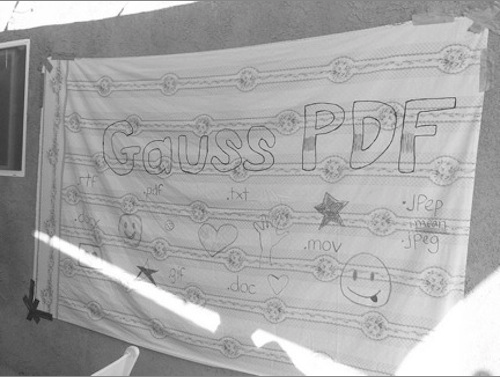
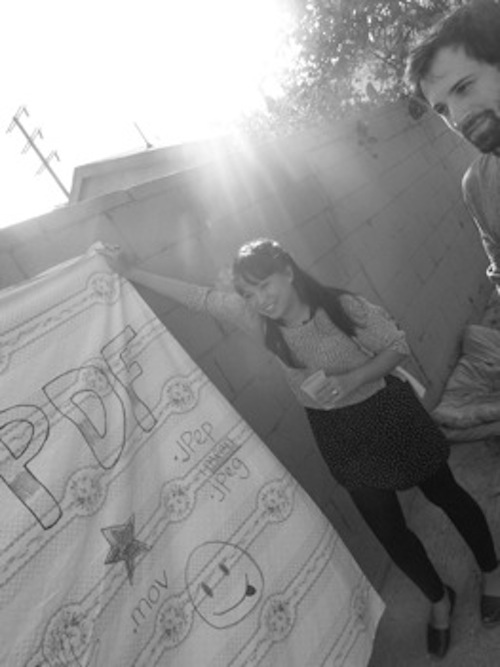
Feliz talked about how a bed sheet was the opposite of the internet. A sheet suggests bodies in the flesh. She said bed sheets have more memories than computers and, therefore, should never be tossed away.
What does it mean to support another’s work? To shatter the notion of the solitary, self-serving author? (I think of Roxanne Gay describing writers who just “vomit their words into the universe and then walk away.”) What does it mean to create the space for writing to happen?
As a start, we opened up our homes.
Writer and teacher Amanda Ackerman earned an MFA at the California Institute of the Arts. Her work blurs...
Read Full Biography

